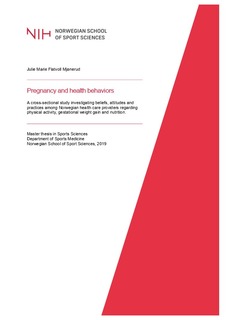| dc.description.abstract | BACKGROUND: As far as we know there is only one study examining beliefs, attitudes and practices of Norwegian health care providers towards regular exercise, gestational weight gain (GWG) and nutrition during pregnancy (Mass, 2016). The providers may lack knowledge or skills to undertake this type of counseling, or it may be of low priority in the context of a typical prenatal visit. Hence, the present study aimed at replicating Dalhaug´s (Mass) study with a larger more representative population, especially in regard to midwives practicing in prenatal care. The main aims were to examine beliefs, attitudes, and practices of Norwegian health care providers towards regular PA, GWG and nutrition during pregnancy and compare counseling practices of midwives and family physicians.
METHODS: The present project was a cross-sectional study conducted from January to April 2019, in Oslo and Akershus, Norway. Midwives and family physicians were asked to answer a questionnaire investigating their lifestyle, beliefs, attitudes and practices regarding the recommendations for regular PA, GWG and nutrition during pregnancy, and their capacity to provide the information to pregnant women. The questionnaire is the same questionnaire used in part B in Dalhaug´s (Mass) study. Participant data (n=15) from Dalhaug´s (Mass) study was included in the current dataset (n=68) to add more data to the current project (n=83).
MAIN RESULTS: The most unpleasant topic to talk about according to the health care providers was GWG. Over 90% of the health care providers reported giving advice on PA, GWG and nutrition to all pregnant patients. However, almost 70% of the respondents did not give advice consistent with the health authorities recommendations for PA (ACOG, 2015). With respect to advice on GWG, 50% of all the providers reported values discordant with the IOM recommendations (2009). Nutritional advice given in accordance with ACOG (2015) was given by approximately 70-85% on selected food groups.
CONCLUSION: Supplementary education for Norwegian health care providers may be needed to improve the knowledge of recommendations, especially regarding PA and GWG. | nb_NO |
